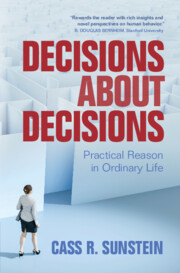Book contents
- Decisions about Decisions
- Decisions about Decisions
- Copyright page
- Contents
- Tables
- Preface
- 1 Second-Order Decisions
- 2 Deciding to Opt
- 3 Deciding to Know
- 4 Deciding to Believe, 1
- 5 Deciding to Believe, 2
- 6 Deciding Inconsistently
- 7 Deciding to Consume, 1
- 8 Deciding to Consume, 2
- 9 Deciding by Algorithm
- 10 Deciding for Oneself
- Epilogue “Get Drunk!”
- Acknowledgments
- Index
1 - Second-Order Decisions
Published online by Cambridge University Press: 29 June 2023
- Decisions about Decisions
- Decisions about Decisions
- Copyright page
- Contents
- Tables
- Preface
- 1 Second-Order Decisions
- 2 Deciding to Opt
- 3 Deciding to Know
- 4 Deciding to Believe, 1
- 5 Deciding to Believe, 2
- 6 Deciding Inconsistently
- 7 Deciding to Consume, 1
- 8 Deciding to Consume, 2
- 9 Deciding by Algorithm
- 10 Deciding for Oneself
- Epilogue “Get Drunk!”
- Acknowledgments
- Index
Summary
People are often reluctant to make decisions by calculating the costs and benefits of alternative courses of action in particular cases. Knowing, in addition, that they may err, people and institutions often resort to second order strategies for reducing the burdens of, and risk of error in, first-order decisions. They make a second-order decision when they choose one from among such possible strategies. They adopt rules or presumptions; they create standards; they delegate authority to others; they take small steps; they pick rather than choose. Some of these strategies impose high costs before decision but low costs at the time of ultimate decision; others impose low costs both before and at the time of ultimate decision; still others impose low costs before decision while exporting to others the high costs at the time of decision. Political, legal, and ethical issues are also raised by second-order decisions.
- Type
- Chapter
- Information
- Decisions about DecisionsPractical Reason in Ordinary Life, pp. 1 - 32Publisher: Cambridge University PressPrint publication year: 2023

